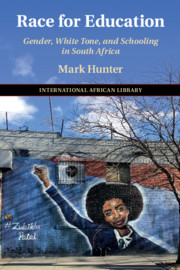Crossref Citations
This Book has been
cited by the following publications. This list is generated based on data provided by Crossref.
Chari, Sharad
2019.
Keywords in Radical Geography: Antipode at 50.
p.
95.
Bähre, Erik
2020.
Wealth‐in‐people and practical rationality: Aspirations and decisions about money in South Africa.
Economic Anthropology,
Vol. 7,
Issue. 2,
p.
267.
Moore, Elena
2020.
Financing Social Reproduction.
Revue internationale des études du développement,
Vol. 242,
Issue. ,
p.
37.
McGrath, Kevin F.
Moosa, Shaaista
Van Bergen, Penny
and
Bhana, Deevia
2020.
The Plight of the Male Teacher: An Interdisciplinary and Multileveled Theoretical Framework for Researching a Shortage of Male Teachers.
The Journal of Men’s Studies,
Vol. 28,
Issue. 2,
p.
149.
Hunter, Mark
2020.
Race and the Geographies of Education: Markets, White Tone, and Racial Neoliberalism.
Annals of the American Association of Geographers,
Vol. 110,
Issue. 4,
p.
1224.
Webb, Christopher
2021.
Liberating the family: Debt, education and racial capitalism in South Africa.
Environment and Planning D: Society and Space,
Vol. 39,
Issue. 1,
p.
85.
Freiherr von der Ropp, Klaus
2021.
Mit vereinten Kräften: Letzte Chance einer Stabilisierung des neuen Südafrikas.
Zeitschrift für Außen- und Sicherheitspolitik,
Vol. 14,
Issue. 3,
p.
303.
Nussey, Charlotte
2021.
‘A long way from earning’: (re)producing violence at the nexus of shame and blame.
Oxford Development Studies,
Vol. 49,
Issue. 1,
p.
53.
Chisholm, Linda
2021.
Sprache – Bildung – Geschlecht.
p.
135.
Cooper, Adam
2021.
“Dancing on the ceiling” : young Black entrepreneurs leveraging capitals across sub-fields in Johannesburg tourism.
Social Dynamics,
Vol. 47,
Issue. 3,
p.
403.
Webb, Christopher
2021.
“These aren’t the jobs we want”: youth unemployment and anti-work politics in Khayelitsha, Cape Town.
Social Dynamics,
Vol. 47,
Issue. 3,
p.
372.
Danielsen, Lotte
2021.
Denunciations of dependence.
Focaal,
Vol. 2021,
Issue. 90,
p.
47.
Pattman, Rob
and
Bhana, Deevia
2021.
Gender, Sexuality and Violence in South African Educational Spaces.
p.
203.
Hunter, Mark
and
Morrell, Robert
2021.
Corporal punishment and gender equality: regimes of care and rights in South African schools.
Journal of Gender Studies,
Vol. 30,
Issue. 3,
p.
344.
Posel, Dorrit
and
Hunter, Mark
2022.
Living alone in the age of freedom: The paradox of solo households in postapartheid South Africa.
Population, Space and Place,
Vol. 28,
Issue. 8,
Wallace, Jennifer
and
Feldman, Jennifer
2022.
Scholarship Students in Elite South African Schools.
Vol. 16,
Issue. ,
p.
1.
Wallace, Jennifer
and
Feldman, Jennifer
2022.
Scholarship Students in Elite South African Schools.
Vol. 16,
Issue. ,
p.
15.
Posel, Dorrit
Hunter, Mark
and
Rudwick, Stephanie
2022.
Revisiting the prevalence of English: language use outside the home in South Africa.
Journal of Multilingual and Multicultural Development,
Vol. 43,
Issue. 8,
p.
774.
Soudien, Crain
Reddy, Vijay
and
Harvey, Jaqueline
2022.
Primary and Secondary Education During Covid-19.
p.
303.
2022.
Comparative Urbanism.
p.
387.



